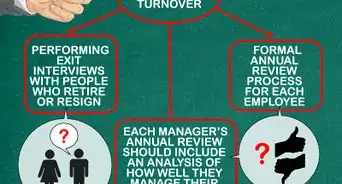This article was co-authored by Elizabeth Douglas. Elizabeth Douglas is the CEO of wikiHow. Elizabeth has over 15 years of experience working and managing teams in the tech industry. She has held roles in multiple areas, including computer engineering, user experience, and product management. She received her BS in Computer Science and her Master of Business Administration (MBA) from Stanford University.
There are 15 references cited in this article, which can be found at the bottom of the page.
wikiHow marks an article as reader-approved once it receives enough positive feedback. This article received 18 testimonials and 100% of readers who voted found it helpful, earning it our reader-approved status.
This article has been viewed 873,271 times.
Congratulations! You finally got that promotion you’ve always wanted, and now you’re a manager. If this is your first foray into management, you might be a bit nervous. That feeling is understandable, common, and, in fact, quite warranted. This is going to be very different from anything you’ve done before. Nevertheless, most managers learn by doing, so there’s no better way to learn than on the job. Prepare for the transition by learning what is required of you and don’t forget to manage your time.
Steps
Preparing for the Transition
-
1Study management styles you've been exposed to. Think back to the managers you’ve had in your career. Whose style worked and whose didn’t? Which managers did a good job coaching and motivating people? If you are still in contact with any of them, set up an appointment to meet. Ask any questions that you have.[1]
- Don’t expect someone to give you the silver bullet to being a great manager. Becoming an effective manager requires time, effort, and experience.
-
2Ask Human Resources about available trainings. You’ll be wearing a lot of different hats as a manager. Suddenly, you might be responsible for signing off on timesheets, hiring staff, and giving performance reviews. Ask Human Resources if there are trainings you can take to learn the nuts and bolts.[2]
- Realize that you’ll learn more from experience than formal training.[3] The best way to learn to manage people is to roll up your sleeves and start working.
Advertisement -
3Read books on becoming a manager. There is also a mountain of literature on how to manage people. Reading books on the topic can help you understand the experiences of others and how you can craft a management style that works best for you. Go to the bookstore or library and pick up some of the following:[4]
- Blanchard and Johnson, The One Minute Manager
- Covey, The Seven Habits of Highly Effective People
- Maxwell, The 21 Irrefutable Laws of Leadership
- Carnegie, How to Win Friends and Influence People
-
4Take management courses. Contact your local college or university to see what is offered. Common management courses cover topics such as organizational behavior, labor-management relations, and small business management. You can ask your supervisor whether the company will cover the costs associated with the courses.
- If you don’t have a college degree, you can work towards a bachelor’s in business management. If you already have a four-year degree, consider earning a Master’s in Business Administration (MBA).
-
5Think of yourself as a leader. As a manager, you now have a new professional identity. Instead of being an individual contributor with a narrow focus, you must now realize that you are responsible for setting the group’s agenda. You are now a leader, not only a worker.[5]
- You also aren’t a peer with your former co-workers. You can expect some former peers to be envious of your new job, but remember that your focus is not to be best friends with your team. Although you don’t need to be snob, you should remain a little removed from the water cooler gossip.
-
6Find a mentor. A mentor can answer any questions you have. They also will increase your stature in the eyes of upper-level management. It shows maturity to get a mentor, and they can be a huge asset.
- A mentor should be someone several steps up the ladder.[6] For example, if you’ve just taken a treasury position, you might want the Chief Financial Officer as your mentor.
- Many people feel uncomfortable asking someone to be a mentor. However, the mentor-mentee relationship usually develops naturally. Take in interest in what your potential mentor is doing. Ask to serve on committees and take them out to lunch. If there’s a connection, they may volunteer to take you under their wing. If a potential mentor doesn’t volunteer, you might need to ask.
-
7Hire a business coach. Many executives hire coaches, but managers can get them, too. A coach is a trained professional who is focused on helping you develop your own authentic management style.[7]
- You need to pay coaches, so check whether you can afford it. Fees vary by location, but you can expect to pay $50 an hour at a minimum.[8]
- You can find business coaches online and on websites like LinkedIn. Google the coach’s name to check their reputation.
Communicating with Your Team
-
1Get to know your team members. You can’t manage a team until you learn more about individual team members. You need to know their strengths and weaknesses, as well as what motivates them. There are many formal and informal ways to get to know your team.
- Read prior employee evaluations. They should identify each employee’s strengths and weaknesses.
- Stop and chat. One advantage of being the first to arrive and the last to leave is that you have plenty of time to talk informally with people.[9] Ask how their job is going and what they need help with.
- Host a team dinner once a month and encourage staff to bring along their significant others. Pick up the tab. Seeing people interact informally can reveal a lot about what motivates them in life.
EXPERT TIPElizabeth Douglas is the CEO of wikiHow. Elizabeth has over 15 years of experience working and managing teams in the tech industry. She has held roles in multiple areas, including computer engineering, user experience, and product management. She received her BS in Computer Science and her Master of Business Administration (MBA) from Stanford University.CEO of wikiHow
 Elizabeth Douglas
Elizabeth Douglas
CEO of wikiHowElizabeth Douglas, CEO of wikiHow, advises: “Understand that when you manage people you can't manage them all the same way — that each person needs a different kind of support and guidance from a manager. To find these differences, it’s really important to try different things out and ask for feedback.”
-
2Hold regular meetings with your team. You’re going to have to establish a communication style. However, you won’t immediately know what works with your team. At your weekly meeting, pay attention to how your team responds. Some team members might hate regular meetings and prefer communication by email. You’ll need to tailor your management style to the members of your team, which might mean holding one-on-one meetings with team members to see how things are going.
-
3Learn how to give effective feedback. Giving feedback is an art, and the only way to learn is to practice. Make sure your feedback is sufficiently specific and actionable.[10] You don’t just want to boost someone’s self-esteem. You want your team members to leave knowing what they should do in future situations.
- Use “I” language instead of “you” language. “I think it’s more effective to listen when a customer complains” is better than, “You only made things worse when you argued with that customer.”[11]
- Your feedback should focus on actionable solutions. Give employees concrete steps to follow.
-
4Practice listening. New managers might think they need to have all of the answers, but listening is vital. Involve your team as much as you can. Ask them what ideas they have for solving problems, and implement the ones that are sensible.[12] Always remember to give credit where credit is due.
- Active listening requires that you face your team member and give them your undivided attention. Close your email and send phone calls to voicemail.
- Be nonjudgmental. If you immediately shoot down ideas, your team will hesitate to share with you in the future.
Working Productively with Your Team
-
1Identify how your team fits into the organization. Every team needs goals, and company morale will suffer if your team doesn’t know what it should be doing. However, new managers are often unclear themselves about what their goals should be. You need to speak to your superiors in the company. Ask how your team fits into the organization as a whole.
-
2Help employees prioritize their work. Successful teams should have a lot of work, and team members might not understand which tasks to complete first. As the manager, you can see the bigger picture. Go ahead and direct your team members as to which tasks they should complete first. Convey this information orally and in email for maximum effectiveness.[13]
-
3Delegate to your team. Most new managers find it hard to delegate because they don’t yet trust the members of their team. However, you’ll quickly burn out if you don’t delegate.[14] The best way to go about delegating tasks? Start small. Give your team members minute tasks and see who does the best job. Keep going back to those who can deliver excellent results.
-
4Admit when you are wrong. You don’t need to appear invulnerable. This might be hard to accept at first, especially if you aren’t feeling secure in your position as manager. Nevertheless, your team will learn it’s okay to admit when they are wrong and to ask for help.[15]
-
5Reward exceptional performance. There are many types of rewards—money is only one (though usually appreciated). The reward should be on par with the exceptional performance. However, you’ll need to see what works best for your employees. Consider the following:
- To reward a one-time exceptional performance, you can write a sincere thank-you letter. Tell your employee what they did well and thank them for their effort.[16]
- Rewarding exceptional performance in staff meetings by complimenting someone who put in outstanding effort. However, some employees dislike being recognized in person, so pay attention to how they respond to know what to do and avoid in the future.
- To reward consistent, outstanding performance you can name an employee of the month or put on a recognition ceremony where you give someone a more substantial gift, such as a gift card.
-
6Learn how to discipline appropriately. There will inevitably be times when you need to correct behavior. Your company should have a discipline policy that you must follow. For example, some companies use progressive discipline: you start with a verbal warning and then give a written warning, followed by more severe discipline.[17] Ask Human Resources about the policy and follow it to a “T.”
- Discipline is more than punishment, however. It also gives you a chance to intervene in your employee’s negative behaviors. If necessary, point them in the direction of your employee assistance program (EAP), where they can get help for addiction, financial problems, and relationship issues.
-
7Learn from your mistakes. When the workplace is your classroom, you should receive instant feedback about your shortcomings as a manager: you won’t meet your team goals, employees will quit on you, and so on. Take time to reflect on what you did wrong, if anything. Lean on your mentor or coach to help you understand areas of improvement.
Warnings
- Don't reprimand your entire department for something that one person is doing wrong. For example, if Jane is the only employee who is constantly late for work, don't send out a group email warning everyone to be on time or else. Meet with Jane privately to discuss the problem.⧼thumbs_response⧽
- You’ll need to learn the company’s rules regarding confidentiality. As a manager, you’ll have employees come to you with personal and work problems. You need to learn how to respond, and your company should have rules in place.⧼thumbs_response⧽
References
- ↑ https://www.themuse.com/advice/firsttime-manager-how-to-fasttrack-your-education
- ↑ https://www.themuse.com/advice/firsttime-manager-how-to-fasttrack-your-education
- ↑ https://hbr.org/2009/01/how-people-learn-to-become-man
- ↑ https://www.inc.com/geoffrey-james/the-9-books-every-boss-should-read.html
- ↑ https://hbr.org/2009/01/how-people-learn-to-become-man
- ↑ https://www.forbes.com/sites/kathycaprino/2014/09/21/how-to-find-a-great-mentor-first-dont-ever-ask-a-stranger/#67db8bfbdfa1
- ↑ https://www.forbes.com/sites/forbescoachescouncil/2016/03/24/eight-signs-its-time-to-hire-a-business-coach/#3df601fd5150
- ↑ https://www.americanexpress.com/us/small-business/openforum/articles/5-questions-you-must-ask-before-hiring-a-business-coach/
- ↑ https://www.forbes.com/sites/jeffboss/2016/10/11/3-not-so-boring-ways-to-get-to-know-your-team/#5e2604f25898
- ↑ https://www.forbes.com/sites/forbescoachescouncil/2016/10/21/how-the-most-effective-managers-give-feedback/#6489cdb6546b
- ↑ https://www.fastcompany.com/3048955/a-first-time-managers-guide-to-giving-effective-feedback
- ↑ https://www.entrepreneur.com/article/237470
- ↑ http://www.businessinsider.com/8-habits-of-highly-effective-google-managers-2011-3
- ↑ https://www.inc.com/janine-popick/the-ultimate-balance-how-top-execs-juggle-work-family.html
- ↑ https://www.forbes.com/sites/jacobmorgan/2014/11/20/the-10-principles-of-the-future-manager/2/#73c2dda02004
- ↑ https://hbr.org/2016/05/recognizing-employees-is-the-simplest-way-to-improve-morale
- ↑ https://www.entrepreneur.com/article/79928#
- ↑ https://hbr.org/2009/01/how-people-learn-to-become-man
About This Article
To learn to manage people, get to know and hold regular meetings with your team to establish open communication. When you're interacting with your team, carry and present yourself like a leader rather than a peer. Work on giving effective feedback, delegating tasks, and helping your team members prioritize their work. You can also ask Human Resources about available training or look into management courses at your local college if you want more formal instruction. For tips on rewarding and disciplining employees constructively, read on!
















































































